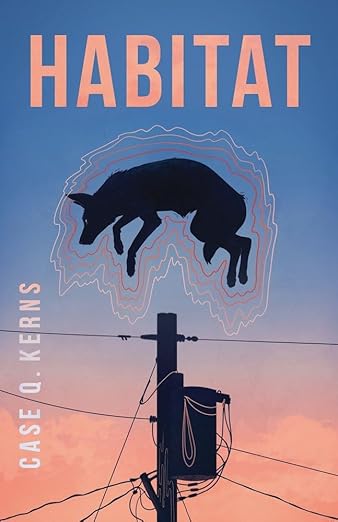Black Lawrence Press, August 2025

In Habitat, a delectably creepy novel-in-stories, set slightly in the future, Case Q. Kerns imagines how late-stage capitalism plays itself out in the worst possible ways. The corporate world is fully in charge as brutal civil suits replace the rule of law in a world sharply divided between the few haves and the many have-nots. Countries, such as they are, look the other way because they don’t want to get on the wrong side of the all-powerful corporations. Education requires a corporate sponsorship (read: indenture), and those who aren’t sponsored have only their bodies to sell, parts of which can be sold for decorative transplants. These status symbols for the wealthy create needless and horrific human suffering, in spite of the fact that in this future world, limbs can be easily cloned. The poor can also sell their bodies for sex, but since that industry is now under the corporate control, freelance tricks are considered “an act of conspiracy against the state,” and punishment is extreme.
The corporate education sponsorships play an outsized role in the minds of the parents in these stories because if their children are not successful there will be no one to take care of them in old age, social safety nets having gone the way of free will and democracy. It might well be that corporations are trying to phase out old age entirely with BBQ “charcoal” that is almost certainly radioactive. The fate of animals is even more disturbing. Creatures are kept alive and captive for their valuable and marketable DNA. In one story, a character must rush to buy a living Indochinese tiger before it is sold in pieces on the black market. “She reminded herself there’s no adapting to extinction.” Animals in other stories spring from the marketing minds of children’s TV shows. These are not cute plush toys, but cloned character animals for pets, the price of which can drive families to ruin.
Corporations are attached at the hip to research institutions, where grim bunker experiments are conducted. It’s all about creating habitats by then, as natural habitats have been fully extracted for profit. As dystopian as this all sounds, there’s a teeny whiff of hope at the end, particularly for the animals. There’s also a bit of interesting supernatural activity that appears in a couple of the stories, as the planet itself objects to human behavior, “an ancient beast made up of the earth itself.” The natural world inches forward, for better or worse, still inhabited by humans, the violent, cunning mammals we always were.
JoeAnn Hart writes about the pervasive and widespread effects of the climate crisis on the natural world and the human psyche. Her most recent book, Arroyo Circle, a story of reclamation in a time of loss, was released by Green Writers Press in 2024. Her other books include the prize-winning environmental and animal fiction collection Highwire Act & Other Tales of Survival, the crime memoir Stamford ’76: A True Story of Murder, Corruption, Race, and Feminism in the 1970s, as well as Float, a dark comedy about plastics in the ocean published by Ashland Creek Press, and Addled, a social satire. She is a regular reviewer of climate and animal fiction at EcoLit Books.
